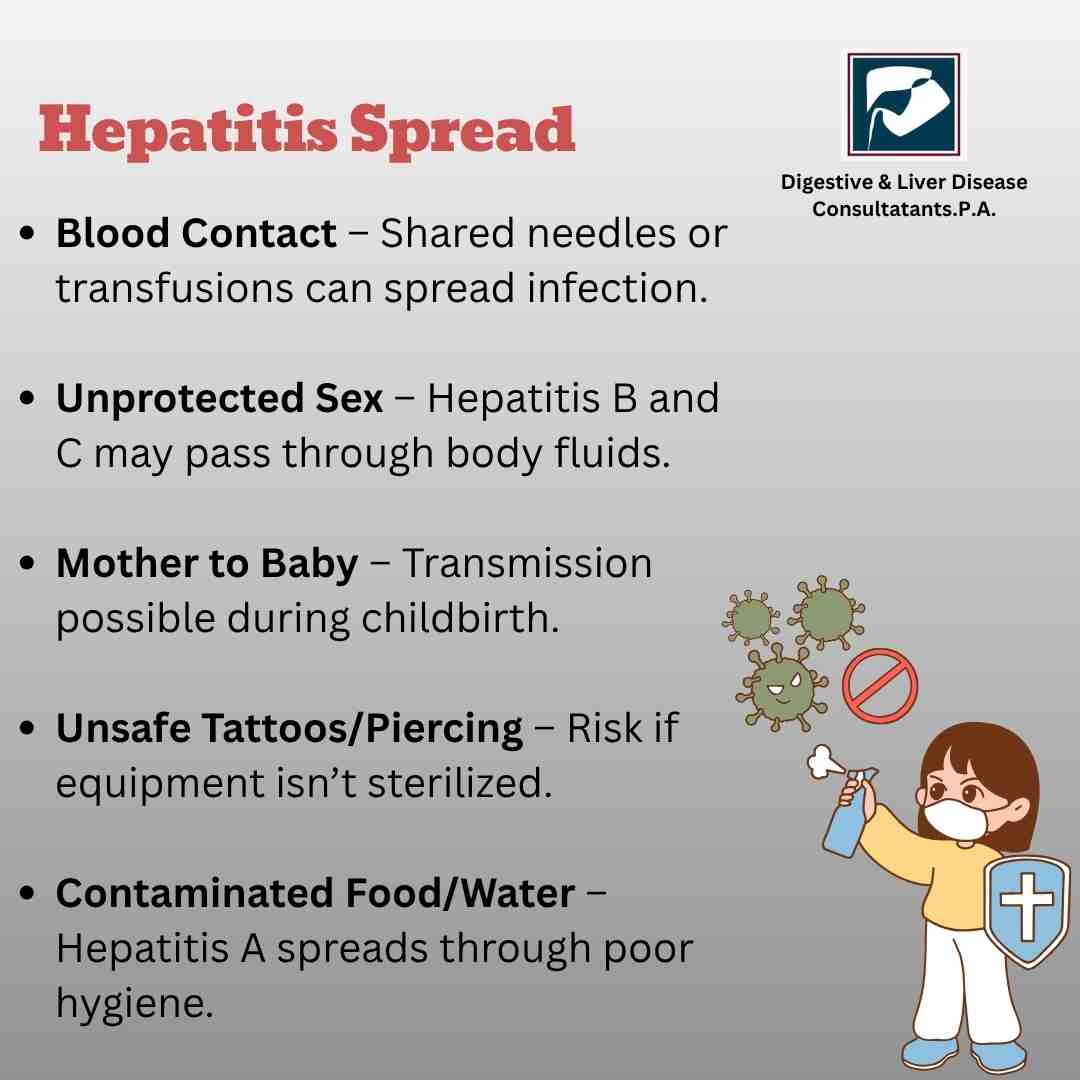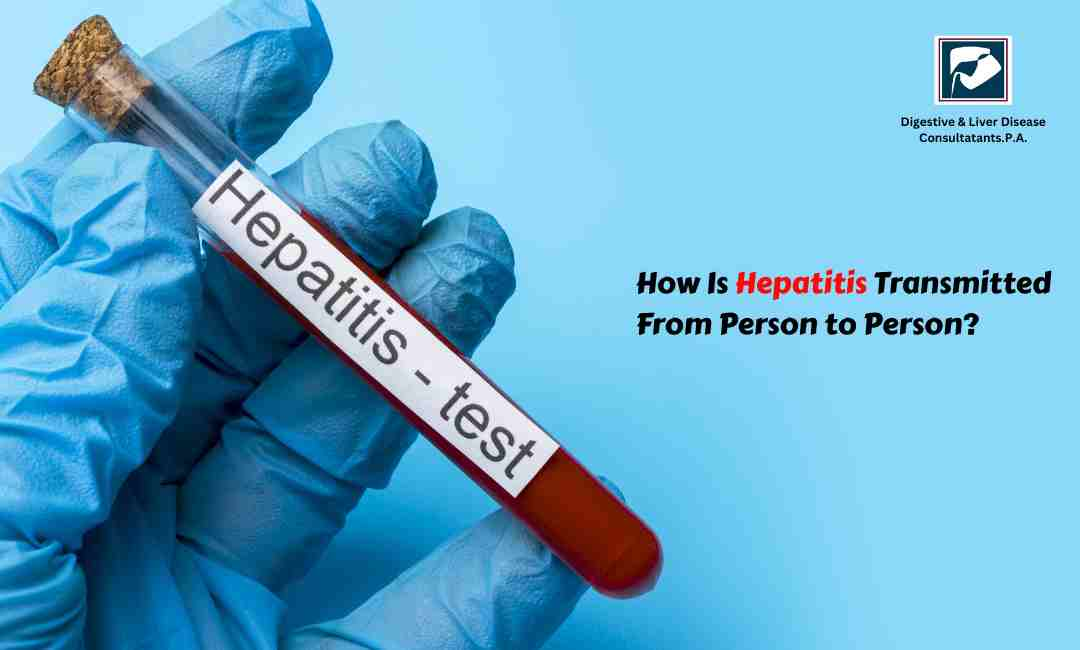Hepatitis is an inflammation of the liver that can be caused by viruses, alcohol use, toxins, or autoimmune conditions. Among these, viral hepatitis is the most common and spreads from person to person in several ways depending on the type of virus. Understanding how hepatitis spreads helps protect yourself and others from infection.
Let’s break down how the main types of viral hepatitis — A, B, and C — are transmitted and how you can prevent them.
Hepatitis A: Spread Through Contaminated Food or Water
Hepatitis A virus (HAV) spreads mainly through the fecal-oral route, which means a person becomes infected by ingesting food or water contaminated with the virus from an infected person’s stool.
Common ways it spreads include:
- Eating food handled by someone who didn’t wash their hands properly
- Drinking contaminated water, especially in areas with poor sanitation
- Eating raw or undercooked shellfish from polluted water
- Close contact with an infected person, including sexual contact
Good news? Hepatitis A usually causes short-term illness and doesn’t lead to chronic liver disease. The infection can be prevented easily with vaccination and proper hygiene practices such as washing hands before eating and after using the restroom.

Hepatitis B: Transmitted Through Blood and Body Fluids
Hepatitis B virus (HBV) spreads through contact with infected blood, semen, or other body fluids. This type of hepatitis can become chronic and cause long-term liver problems, including cirrhosis or liver cancer.
Common transmission routes include:
- Unprotected sexual contact with an infected person
- Sharing needles or syringes
- From mother to baby during childbirth
- Sharing razors, toothbrushes, or other personal items with an infected person
- Accidental exposure in healthcare settings
Vaccination is the most effective way to prevent Hepatitis B. The Hepatitis B vaccine is safe, widely available, and offers lifelong protection for most people. Using condoms, avoiding sharing personal items, and ensuring medical equipment is properly sterilized are also key preventive steps.
Hepatitis C: Primarily Spread Through Blood Contact
Hepatitis C virus (HCV) spreads mostly through blood-to-blood contact. Unlike Hepatitis A and B, there is no vaccine for Hepatitis C, making prevention crucial.
You can contract Hepatitis C through:
- Sharing needles or syringes used for drugs
- Receiving contaminated blood transfusions (rare today due to screening)
- Using non-sterile medical or tattoo equipment
- Sharing personal items that may have traces of blood, like razors or nail clippers
Sexual transmission and mother-to-child transmission are possible but less common. The infection often goes unnoticed for years because it can remain silent until liver damage becomes severe. Fortunately, modern antiviral medications can now cure most Hepatitis C infections if diagnosed early.
Other Less Common Types: Hepatitis D and E
Hepatitis D only affects people who already have Hepatitis B, since it depends on the HBV virus to multiply. It spreads through contact with infected blood or sexual contact.
Hepatitis E is similar to Hepatitis A and spreads through contaminated water or food. It’s more common in areas with poor sanitation and usually resolves on its own.
Preventing the Spread of Hepatitis
Here’s what you can do to protect yourself and others:
- Get vaccinated for Hepatitis A and B
- Wash your hands regularly, especially before eating
- Practice safe sex and use condoms
- Avoid sharing needles, razors, or toothbrushes
- Ensure tattoos or piercings are done with sterile equipment
- Drink safe, clean water and eat hygienically prepared food
If you think you may have been exposed to any form of hepatitis, get tested immediately. Early diagnosis can prevent liver complications and help stop further spread.
Living with Hepatitis
People diagnosed with hepatitis should follow up regularly with a gastroenterologist or hepatologist. Maintaining a healthy lifestyle, avoiding alcohol, eating a balanced diet, and taking prescribed medications can help protect the liver and improve overall health.
When to See a Doctor
If you notice symptoms like fatigue, jaundice (yellowing of the skin or eyes), dark urine, abdominal pain, loss of appetite, or nausea, consult a liver specialist right away. Timely care can make a big difference in preventing complications.
About Digestive & Liver Disease Consultants, P.A.
At Digestive & Liver Disease Consultants, P.A., our team of expert gastroenterologists and hepatologists provides advanced diagnosis, treatment, and management for liver and digestive disorders, including all types of hepatitis. We use modern diagnostic tools and personalized care plans to ensure every patient receives the best outcomes.
Conclusion
Hepatitis can spread easily if precautions are ignored, but it’s also preventable with awareness, vaccination, and safe habits. Understanding how the virus transmits from person to person helps you protect yourself and others from this serious liver infection.
If you suspect exposure or experience symptoms of hepatitis, schedule an appointment with Digestive & Liver Disease Consultants, P.A. for expert care and testing. Your liver health deserves attention today to ensure a healthier tomorrow.






